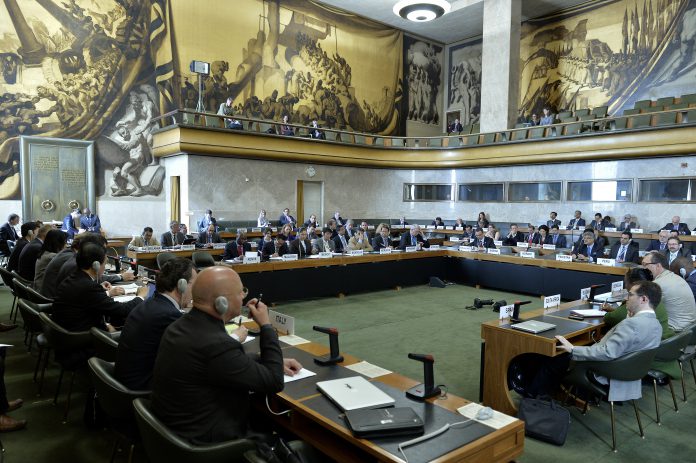The Conference on Disarmament decided to set up five bodies with a mandate to reach agreement on points of convergence, deepen technical discussions and consider effective measures.
At the end of the last public plenary session under Sri Lankan presidency, the Conference on Disarmament adopted a decision submitted by its President, Ambassador Ravinatha Aryasinha of Sri Lanka.
Under the terms of this decision, the Conference decided to establish five separate subsidiary bodies: one for each of the first four items on the Conference agenda (cessation of the nuclear arms race and nuclear disarmament; prevention of nuclear war, including all related matters; prevention of an arms race in outer space ; effective international arrangements to assure non-nuclear-weapon States against the use or threat of use of nuclear weapons) and a fifth on agenda items 5, 6 and 7 (new types of weapons of mass destruction and radiological weapons; comprehensive program of disarmament; transparency in armaments) - a fifth subsidiary body which could also consider emerging issues or other matters of relevance to the Conference.
In their work, these five subsidiary bodies should aim to achieve the following and any other points they agree in accordance with the rules of procedureto reach agreement on the points of convergence at the Conference, taking into account all relevant past, present and future views and proposals; to deepen technical discussions and broaden areas of convergence, including through the participation - in accordance with the Rules of Procedure - of relevant experts; and to consider effective measures, including legal instruments for negotiation.
Each of these subsidiary bodies will be chaired by a coordinator appointed by the Conference, under the leadership of the Chairman, on the basis of equitable geographical distribution. Subsidiary bodies will meet in accordance with paragraph 24 of the Rules of Procedure and will conduct their work in accordance with paragraph 18 of the Rules of Procedure, with equal allocation of time. The subsidiary bodies will remain open to all Member States of the Conference and to non-Member States invited by the Conference to participate in its work for the 2018 session.
The progress report agreed within each of the subsidiary bodies should be submitted by each coordinator to the Conference (through the Conference President) for adoption and to be duly reflected in the annual report (from the Conference to the General Assembly). This decision is taken for the 2018 session, without prejudice to any subsequent decision at the start of future Conference sessions.
Following the adoption of this decision, the President of the Conference emphasized that it represented a compromise between the different positions expressed by the delegations; he therefore thanked all the delegations for the flexibility they had shown in adopting this text, which will undoubtedly enable the Conference to move forward.
Sweden, which will assume the presidency of the Conference from next week, pointed out that the draft adopted fell far short of the original proposal put forward by the Conference presidency. Prior to the adoption of this text, many delegations expressed their views on the original draft, and a number of proposed amendments were put forward before a final text could be accepted.
In addition to concerns about compliance with the Rules of Procedure, Iran insisted that guidelines be issued to the subsidiary bodies to ensure that they make tangible progress on all points, noting that it deplored previous practices of giving priority to one issue or another to the detriment of others. Iran also insisted that the present decision should not commit the Conference beyond 2018.
The next public plenary session of the Conference will be held on Tuesday February 20 under the chairmanship of Sweden.


